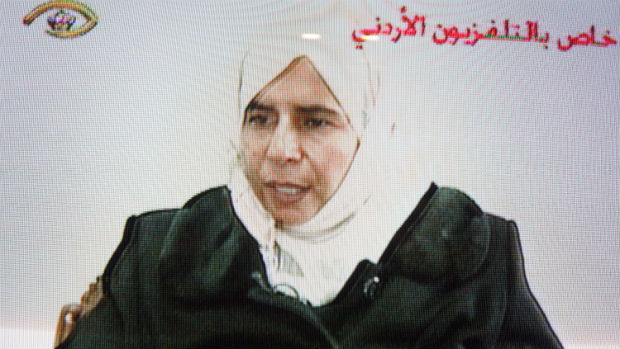Sajida al Rishawi: why her enemies want her freed
Islamic State is seeking the release of Sajida al Rishawi, a failed suicide bomber sent by rival group al-Qaeda

A free daily email with the biggest news stories of the day – and the best features from TheWeek.com
You are now subscribed
Your newsletter sign-up was successful
Islamic State is demanding the release of former al-Qaeda member Sajida al Rishawi, who attempted to blow herself up in a Jordanian hotel.
The militant group has threatened to kill Muath al-Kasaesbeh and Kenji Goto, hostages from Jordan and Japan, unless Rishawi is released from her Jordanian prison cell.
Since al-Qaeda and Islamic State are deadly rivals, some commentators have been surprised that IS would choose to spring Rishawi from jail.
The Week
Escape your echo chamber. Get the facts behind the news, plus analysis from multiple perspectives.

Sign up for The Week's Free Newsletters
From our morning news briefing to a weekly Good News Newsletter, get the best of The Week delivered directly to your inbox.
From our morning news briefing to a weekly Good News Newsletter, get the best of The Week delivered directly to your inbox.
Who is Sajida al Rishawi?
Rishawi, 44, lived with her husband in Ramadi, central Iraq, before the couple travelled to Jordan in 2005 to carry out a suicide attack in a luxury hotel in the capital, Amman. Her brother was reportedly a senior aide to Abu Mussab Alzarqawi, the founder of al Qaeda in Iraq, who was killed by the Americans in 2006, The Guardian reports. Jordanian investigators told the New York Times in 2005 that three of her brothers had previously been killed by the Americans in Iraq.
How did she end up in prison?
In 2005, Rishawi's husband blew himself up at a wedding in a luxury hotel in Amman, the Huffington Post reports, but the loaded suicide belt strapped to Rishawi's chest failed to explode. She was pushed out of the hotel by her husband before he blew himself up. Later, the Jordanian authorities arrested her in her flat in the capital. On Jordanian state TV, Rishawi confessed that she and her husband were sent by al-Qaeda in Iraq to carry out the attack. She was sentenced to death in 2006, but in the same year the Jordanian government placed a moratorium on the death penalty.
A free daily email with the biggest news stories of the day – and the best features from TheWeek.com
Why does Islamic State wants her to be freed?
According to CNN, it has become clear in recent months that al-Qaeda's leadership has fallen out with that of Islamic State. The Associated Press said that securing the release of Rishawi would be 'a major propaganda coup' for IS, following a string of setbacks on the battlefield, most recently in Kobane. It would humiliate al-Qaeda's leaders and, perhaps, win over some of its followers.
-
 The environmental cost of GLP-1s
The environmental cost of GLP-1sThe explainer Producing the drugs is a dirty process
-
 Greenland’s capital becomes ground zero for the country’s diplomatic straits
Greenland’s capital becomes ground zero for the country’s diplomatic straitsIN THE SPOTLIGHT A flurry of new consular activity in Nuuk shows how important Greenland has become to Europeans’ anxiety about American imperialism
-
 ‘This is something that happens all too often’
‘This is something that happens all too often’Instant Opinion Opinion, comment and editorials of the day
-
 Epstein files topple law CEO, roil UK government
Epstein files topple law CEO, roil UK governmentSpeed Read Peter Mandelson, Britain’s former ambassador to the US, is caught up in the scandal
-
 Iran and US prepare to meet after skirmishes
Iran and US prepare to meet after skirmishesSpeed Read The incident comes amid heightened tensions in the Middle East
-
 Israel retrieves final hostage’s body from Gaza
Israel retrieves final hostage’s body from GazaSpeed Read The 24-year-old police officer was killed during the initial Hamas attack
-
 China’s Xi targets top general in growing purge
China’s Xi targets top general in growing purgeSpeed Read Zhang Youxia is being investigated over ‘grave violations’ of the law
-
 Panama and Canada are negotiating over a crucial copper mine
Panama and Canada are negotiating over a crucial copper mineIn the Spotlight Panama is set to make a final decision on the mine this summer
-
 Why Greenland’s natural resources are nearly impossible to mine
Why Greenland’s natural resources are nearly impossible to mineThe Explainer The country’s natural landscape makes the task extremely difficult
-
 Iran cuts internet as protests escalate
Iran cuts internet as protests escalateSpeed Reada Government buildings across the country have been set on fire
-
 US nabs ‘shadow’ tanker claimed by Russia
US nabs ‘shadow’ tanker claimed by RussiaSpeed Read The ship was one of two vessels seized by the US military